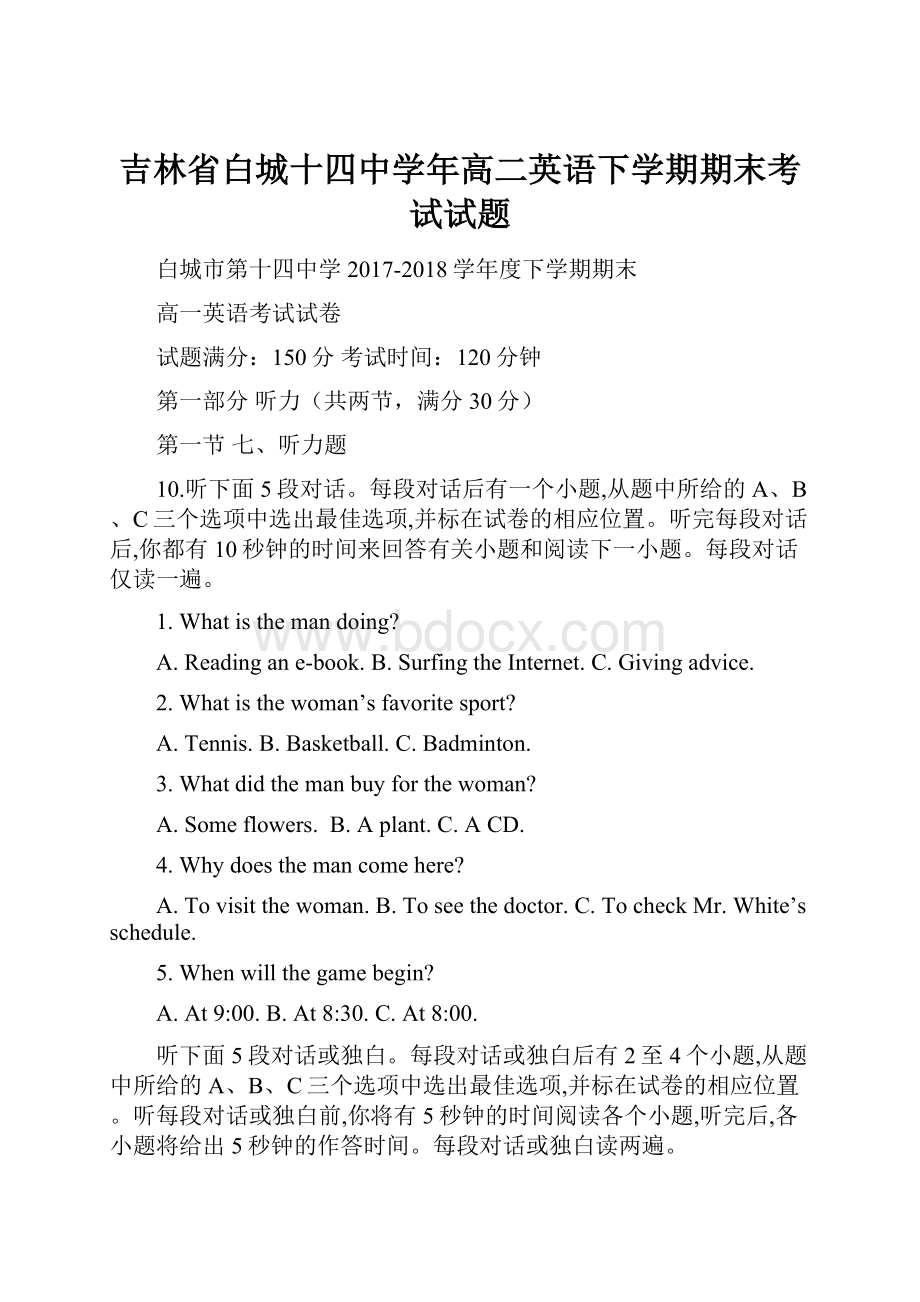吉林省白城十四中学年高二英语下学期期末考试试题.docx
《吉林省白城十四中学年高二英语下学期期末考试试题.docx》由会员分享,可在线阅读,更多相关《吉林省白城十四中学年高二英语下学期期末考试试题.docx(20页珍藏版)》请在冰豆网上搜索。

吉林省白城十四中学年高二英语下学期期末考试试题
白城市第十四中学2017-2018学年度下学期期末
高一英语考试试卷
试题满分:
150分考试时间:
120分钟
第一部分听力(共两节,满分30分)
第一节七、听力题
10.听下面5段对话。
每段对话后有一个小题,从题中所给的A、B、C三个选项中选出最佳选项,并标在试卷的相应位置。
听完每段对话后,你都有10秒钟的时间来回答有关小题和阅读下一小题。
每段对话仅读一遍。
1.Whatisthemandoing?
A.Readingane-book.B.SurfingtheInternet.C.Givingadvice.
2.Whatisthewoman’sfavoritesport?
A.Tennis.B.Basketball.C.Badminton.
3.Whatdidthemanbuyforthewoman?
A.Someflowers. B.Aplant.C.ACD.
4.Whydoesthemancomehere?
A.Tovisitthewoman.B.Toseethedoctor.C.TocheckMr.White’sschedule.
5.Whenwillthegamebegin?
A.At9:
00.B.At8:
30.C.At8:
00.
听下面5段对话或独白。
每段对话或独白后有2至4个小题,从题中所给的A、B、C三个选项中选出最佳选项,并标在试卷的相应位置。
听每段对话或独白前,你将有5秒钟的时间阅读各个小题,听完后,各小题将给出5秒钟的作答时间。
每段对话或独白读两遍。
听第6段对话,回答第6、7题。
6.Wheredoestheconversationprobablytakeplace?
A.Atacinema.B.Atarestaurant.C.Atarailwaystation.
7.Howmuchshouldthewomanpay?
A.$35B.$40.C.$75.
听第7段对话,回答第8至10题。
8.Whatdoesthewomanwanttoknow?
A.Wherethebusstopis.B.Howlongthestreetis.C.Howmuchchangethemanhas.
9.Wheredoesthewomancomefrom?
A.Anothercity.B.Anotherstate.C.Anothercountry.
10.Whatdoesthemanthinkofwhatthewomanplanstodo?
A.Rude.B.Usual.C.Wonderful.
听第8段对话,回答第11至13题。
11.Howmanypeopleareinvited?
A.TwoB.Three.C.Four.
12.Whatdoweknowabouttheman’sneighborandhersister?
A.Theylivebythemselves.
B.Theyareintheirlatesixties.
C.Theyhavemetthewomanbefore.
13.Whatwillthewomanbringtotheparty?
A.Pies.B.Cakes.C.Biscuits.
听第9段对话,回答第14至16题。
14.Howlonghasthemanbeenawayfromhisapartment?
A.Twodays.B.Twoweeks.C.Threeweeks.
15.What’sthesecondproblemthewomaniscomplainingabout?
A.Theman’snewroommatethrowsrubbisheverywhere.
B.Theman’snewroommateoccupiesherparkingspace.
C.Theman’snewroommatehasn’treturnedherbooks.
16.Whenwillthemantalktohisroommate?
A.Tonight.B.Tomorrowmorning.C.Tomorrowevening.
听第10段对话,回答第17至20题。
17.Whatisthespeakermostprobably?
A.Adoctor.B.Acoach.C.Ateacher.
18.Howoldisthespeaker?
A.30.B.37.C.43.
19.Whichofthefollowingisthespeaker’sopinion?
A.Anytypeofexerciseisusefulforbetterhealth.
B.It’sbettertoexerciseeveryday.
C.Runninghelpspeoplemost.
20.Whatdoesthespeakeradvisepeopletodobeforestartinganyhardexercise?
A.Increasetheirrunningdistance.
B.Checkwiththeirdoctor.
C.Startwithaten-minutewalk.
第二部分:
阅读理解(共20题;每小题2分,满分40分)
第一节:
阅读理解(共15题;每小题2分,满分30分)
阅读下列短文,从每篇短文后所给各题的四个选项(A、B、C和D)中,选出最佳选项,并在答题卡上填写答案。
A
Howdoyouaddress(称呼)peopleinEnglishwhenyouwanttotalktothem?
Thefollowingmaybesomesimplerulesthebeginnersshouldfollow.
1.WhentalkingtostrangersthereisoftennospecialformofaddressinEnglish.Usually,ifyouwanttocatchtheattentionofastrangeritisnecessarytousesuchphrasesas“Excuseme”
2.InBritishEnglish“Sir”and“Madam”areconsideredtobetooformalformostsituations.Theyareusedmostlytocustomersinshopsorrestaurants.WhileinAmericanEnglish“Sir”and“Madam”arenotsoformalandarecommonlyusedbetweenstrangers,especiallywitholdpeoplewhosenamesyoudon’tknow.
3.Whenyoutalktosomepeopleyouknow,youcanusetheirnames.Ifyouarefriends,usetheirfirstnames;ifyourrelationshipismoreformal,use“Mr.,“Mrs.”,“Ms”,etc,beforetheirfamilynames.
4.Therearemanyotherformsofaddresswhichcanbeusedbetweenfriendsandstrangers.However,manyofthesearelimitedinuse.Forexample,“pal”and“mate”canbeusedbetweenstrangers,butareusuallyonlyusedbymentalkingtoothermen.
21.Accordingtothepassage,“Excuseme”ismainlyusedto_____.
A.addressapersonyoudon’tknow
B.apologizetoothers
C.catchtheattentionofastranger
D.suggestgoodmanners
22.IfJohnSmithisyourbestfriend,accordingtothepassageyoushouldoftencallhim_____.
A.JohnB.SmithC.Mr.JohnD.Mr.Smith
23.WhichofthefollowingisNOTtrue?
A.“Sir”and“Madam”areusedmoreofteninAmericathaninEngland.
B.Peopleoftenuse“Mr.”,“Mrs.”or“Ms.”beforethefirstnamesofthosepeoplewhotheydon’tknowverywell.
C.“Pal”and“mate”areusuallyonlyusedamongmen.
D.Whileaddressingfriends,peoplejustusetheirfirstnames
24.ThepassageismostlylikelytakenfromanEnglish_____.
A.textbookB.cardC.storybookD.grammarbook
B
Onahotsummerday,afriendandIdecidedtogototheforestforawalk.Sowewenttotheforestbycar.Wewalkedaroundforawhile(—会儿) 。
Thenwerealizedthatweshouldprobablypayattentiontowherewe’regoing,sowewouldn'tgetlost.Wenoticedamarkedpathanditlookedlikethepathwhichwetookfromtheparkinglot(停车场).Westartedfollowingit.Aftertwohours,werealizedwewerejustloopingaround.Thepartofthepaththatwassupposedtotakeusbacktothecarseemednowheretobefound!
Soweleftthemarkedpath,inthehopeoffindingourwayback.Wefoundacyclingpathandfollowedittoaparkinglot.Sadlyitwasn’tourparkinglot!
Amapatthatparkinglotshoweduswherealltheotherparkinglotswereandwenoticedwewerealongwayfromallofthem!
Exceptthat,wecouldn’tknowwhichonewas“our”parkinglot.
Wedecidednottowalktowardsanyofthem.Insteadwewalkeduptoahousenearby.Aladywasunloading(卸载)herfoodfromhercar,andweaskedifshecouldhelpus.Wedescribedtoherwherewehadcomefromandwhattheroadslookedlike.Sheimmediatelyknewtheplacewedescribedandsaidthatwewerealongwayoff.Andthen,tomysurprise,shesaid“Whydon’tyoujumpintothecar?
I’lltakeyouthere.”Icouldn’tbelieveitandshouted:
“Really?
!
”Iwassoexcited.Shedroveusrightbacktoourcar,andweweresograteful.
25.Whydidtheauthorandhisfriendwalkalongthemarkedpath?
A.Becausetherewerenootherpathsthere.
B.Becausetheythoughtitcouldleadtotheirparkinglot.
C.Becauseitwastheshortestpathintheforest.
D.Becausetheycouldgotothedeepestpartoftheforest.
26.Theunderlinedwords "loopingaround"inParagraph1mean .
A.movinginawaythatmakesacircle
B.lookingforthepatharound
C.walkingaroundbyfollowingapath
D.stayinginthesameplace
27.Aftertheywalkedalongacyclingpath,they .
A.werefarawayfromallparkinglots
B.returnedtotheirparkinglot
C.foundawaybacktotheirparkinglot
D.gotamapshowingdirections
28.Theydecidedtowalktoahousenearbyinorderto
A.haveagoodrestB.findaguideC.lookforfoodD.askfordirections
C
Themomhaddiedwhentherescuersfoundheraftertheterribleearthquake.Shewascoveredbyadestroyedhouse.Throughgaps(缝隙)ofthoseruins,therescuerscouldseeherlastposture(姿势).Itwassomethinglikeanancientpersonwhowaskowtowing(叩头),butitjustlookedstrangebecauseshewasoutofshapebypressure.
Therescuersconfirmedherdeathbytouchingherthroughthegapsoftheruins.Theyshoutedattheruinsagainandagain,knockedthebricksusingvarioustools,butnoreplyinside.
Thentherescuingteamwenttothenextbuilding.Suddenlytheleaderranback,calling“Comehere”.Hecametothebody,puthishandsunderthewoman,feelingandtouching,thenshoutedloudlyandgladly,“Thereissomeone,ababy,stillliving.”
Throughsomeefforts,rescuerscleanedupthe ruinswhichblockedher.Underherbodylayherbaby,whowascoveredbyasmallredquilt(棉被).Hewasabout3or4months’old.Sincewellprotectedbyhismother'sbody,hewassafe.Hewasinadeepsleepwhentherescuercarriedhimout,andhislovelyandpeacefulfacewarmedeveryonearoundhim.Thedoctor,alongwiththerescuingteam,tookthebabyoutofthequilttocheckifthebabywasallright,andhefoundtherewasamobilephoneinthequilt.Thedoctorlookedatthescreen;awrittenmessagewasalreadythere:
“Mydearbaby,ifyoucouldlive,don’tforgethowmuchIloveyou.”Asadoctor,heexperiencedmuchofthistypeofseparation;butatthismoment,hecried.Themobilephonewaspassed,andeverypersonwhosawthismessageshed(流出)tears.
29.Whentherescuersfoundthemom,she .
A.wasusinghermobilephonetoaskforhelp
B.beggedtherescuerstosaveherbabyfirst
C.wasstrugglingwiththepressure
D.didn’thavethenormalshape
30.Theunderlinedword“confirmed”inParagraph2maymean .
A.provedB.inferredC.guessedD.imagined
31.Afterseeingthewordsonthemobilephone,peoplewas .
A.pleasedB.excitedC.movedD.tired
32.Thepassageismainlyabout .
A.astoryofsavingamotherandherbaby
B.thedisasterofaterribleearthquake
C.therescuers,hardworkafteranearthquake
D.thegreatloveofamotherintheearthquake
D
AcouplefromMiami,BillandSimoneButler,spentsixty-sixdaysinaliferaft(救生艇)intheseasofCentralAmericaaftertheirboatsank.
Twenty-onedaysaftertheyleftPanamaintheirboat,Simony,theymetsomewhales(鲸).“Theystartedtohitthesideoftheboat,”saidBill,“andthensuddenlyweheardwater.”Twominuteslater,theboatwassinking.Theyjumpedintotheliferaftandwatchedtheboatgounderthewater.
Fortwentydaystheyhadtinsoffood,biscuits,andbottlesofwater.Theyalsohadafishinglineandamachinetomakesaltwaterintodrinkingwater—twothingswhichsavedtheirlives.Theycaughteighttotenfishadayandatethemraw(生的).Thenthelinebroke.“Sowehadnomorefishuntilsomethingverystrangehappened.Somesharks(鲨鱼)cametofeed,andthefishundertheraftwereafraidandcametothesurface.Icaughtthemwithmyhands.”
Abouttwentyshipspa